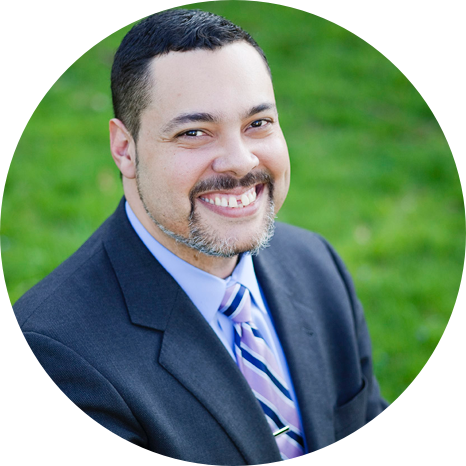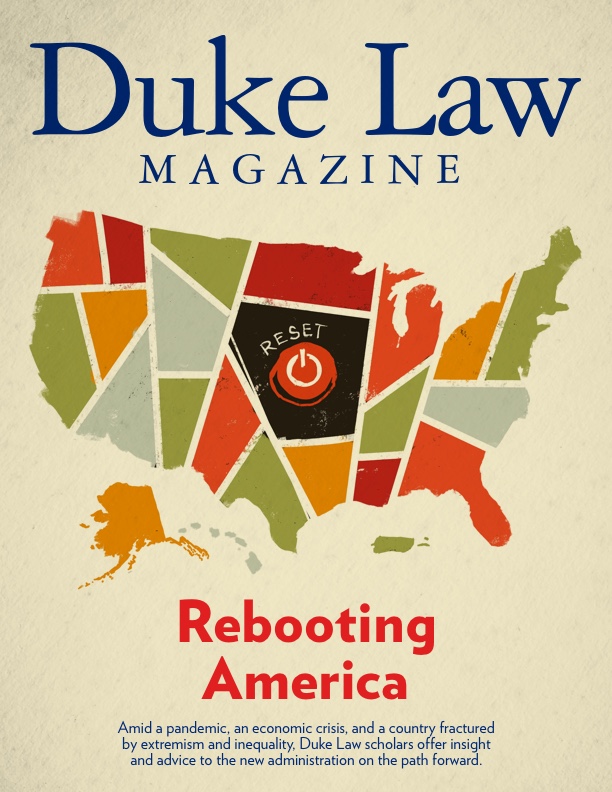
Melvin G. Shimm Professor of Law Darrell A. H. Miller, whose scholarship and teaching focus on civil rights, constitutional law, civil procedure, state and local government law, and legal history, has been elected to membership in the American Law Institute (ALI). Miller, associate dean for intellectual life and co-director of the Duke Center for Firearms Law, was one of 38 individuals whose elections were announced by ALI on July 20.
Miller’s scholarship on the Second and Thirteenth Amendments has been published in leading law reviews such as the Yale Law Journal, the University of Chicago Law Review, and the Columbia Law Review, and has been cited by the Supreme Court of the United States, the United States Courts of Appeals, the United States District Courts, and in congressional testimony and legal briefs. With Lanty L. Smith ’67 Professor of Law Joseph Blocher, he is the author of The Positive Second Amendment: Rights, Regulation, and the Future of Heller (Cambridge University Press, 2018).
Prior to joining the academy, Miller practiced complex and appellate litigation in Columbus, Ohio. He is a former clerk to Chief Judge R. Guy Cole, Jr. of the United States Court of Appeals for the Sixth Circuit.
More than 30 Duke Law faculty scholars and more than 50 alumni are members of ALI. Many faculty participate as reporters, advisers, or consulting members on the group’s projects, including current projects on government ethics, sexual assault, policing, conflict of laws, and other topics.

Robinson O. Everett Professor of Law Nita Farahany JD/MA ’04, PhD ’06 has been inducted as a fellow of the American Association for the Advancement of Science (AAAS), an honor that recognizes important contributions to STEM disciplines, including pioneering research, leadership within a given field, teaching and mentoring, fostering collaborations, and advancing public understanding of science.
Farahany, who also is a professor of philosophy and director of the Duke Initiative for Science & Society, was elected as a fellow by her peers for “distinguished contributions to the field of neuroethics, enabling responsible and equitable development and implementation of new knowledge and technologies in neuroscience,” according to the organization’s announcement. She is among 489 fellows elected in 2020, including six Duke University faculty. A virtual induction ceremony for the new fellows was held Feb. 13.
A leading scholar on the ethical, legal, and social implications of emerging technologies, Farahany also chairs the Duke MA in Bioethics & Science Policy and is a principal investigator of SLAP Lab. She is a frequent media commentator and presents her work to diverse audiences including at the World Economic Forum, TED, and Judicial Conferences for the U.S. Court of Appeals, and AAAS, and has testified before Congress.
In 2010, Farahany was appointed by President Obama to the Presidential Commission for the Study of Bioethical Issues and served until 2017. She is a member of the National Advisory Council for the National Institute for Neurological Disease and Stroke, an elected member of the American Law Institute, president-elect and board member of the International Neuroethics Society, a member of the Neuroethics Working Group of the U.S. Brain Initiative, the Global Precision Medicine Council for the World Economic Forum, and the President’s Research Council for the Canadian Institute for Advanced Research. She is also the chair-elect of the Section on Jurisprudence for the Association of American Law Schools. She serves on Scientific and Ethics Advisory Boards for several corporations.

The Oxford Handbook of Comparative Foreign Relations Law, edited by William Van Alstyne Professor of Law and Professor of Public Policy Studies Curtis Bradley, is being honored by the American Society of International Law (ASIL) with its inaugural Robert E. Dalton Award for Outstanding Contribution in the Field of Foreign Relations Law.
Published in 2019, the handbook includes scholarship resulting from a series of conferences Bradley organized with leading international experts to lay the groundwork for comparative foreign relations law as a new area of teaching and study. He was supported in doing so, in part, through his receipt, in 2016, of an Andrew Carnegie Fellowship and accompanying award from the Carnegie Corporation of New York.
The volume of almost 900 pages is divided into sections that offer a mix of theory, comparative empirical analysis, and country-specific case studies on such topics as entering into and exiting treaties, using military force, extending or refusing immunity to foreign governments and their officials, the impact of federalism on foreign affairs, and the practices of non-nation, supranational bodies like the European Union. It was hailed as a seminal and highly innovative reference work on publication. (Read more.)
ASIL created the Dalton Award in 2020 through a gift from the Dalton Family to honor the life and work “a legendary public servant at the U.S. Department of State and a beloved member of the Society for more than 50 years,” according to ASIL executive director Mark D. Agrast. The selection was made on the recommendation of the society’s Book Awards Committee. The award will be presented during ASIL’s 115th Annual Meeting, which will be held virtually in March.
A founder and co-director of Duke’s Center for International and Comparative Law, Bradley’s scholarly expertise spans the areas of international law in the U.S. legal system, the constitutional law of foreign affairs, and federal jurisdiction, and his courses include International law, Foreign Relations Law, and Federal Courts. He is the author of International Law in the U.S. Legal System (Oxford University Press, 2013, 2d ed. 2015, 3d ed. 2020), among other books, and serves as co-editor-in-chief, with Harry R. Chadwick, Sr. Professor of Law Laurence Helfer, of the American Journal of International Law (AJIL).
Bradley served as a reporter on the American Law Institute’s Restatement of the Law Fourth, The Foreign Relations Law of the United States, published in 2018 and is a longtime member of the Secretary of State’s Advisory Committee on International Law.

Clinical Professor and Health Justice Clinic Director Allison Rice co-chaired a subcommittee of experts who contributed recommendations for closing the justice gap as it relates to health to “Civil Justice for All,” a recently released report from the American Academy of Arts and Sciences (AAAS).
Rice, who also engages in HIV and AIDS research and advocacy and had a lengthy career as a legal aid attorney before joining the Duke Law faculty, co-chaired the health subcommittee with Legal Services Corporation Chairman John G. Levi. Levi, a partner at Sidley Austin, also served as one of three co-chairs for the report, which advances seven national recommendations for addressing low-income Americans’ ever-increasing challenges in accessing legal assistance.
The report, part of the AAAS’s “Making Justice Accessible” project, approached the crisis in access to legal services by focusing on four common, often interrelated categories of civil legal problems: family, health care, housing, and veterans affairs. Access to justice challenges for low-income individuals highlighted by the report include an overburdened legal aid system, the inability to afford private lawyers by people disqualified from receiving public legal assistance, and the failure of some to recognize that their problems would benefit from legal interventions.
The health subcommittee’s three key recommendations involve the increased use of medical-legal partnerships to promote a broad definition of health that incorporates its social determinants, facilitate effective and efficient collaboration in solving civil justice problems, and expand sources of revenue for helping to solve health-related legal problems. These track with the report’s broader recommendations to bring new advocates — “service providers who are not lawyers” — into the effort to solve civil justice problems and foster greater collaboration between legal services providers and other trusted professionals. Read more.
David F. Levi, the Levi Family Professor of Law and Judicial Studies, director of the Bolch Judicial Institute, and former dean of Duke Law, also contributed to the report as a member of the housing subcommittee.

Elvin R. Latty Professor of Law Arti Rai has co-authored a white paper with guidance for the use of artificial intelligence (AI) in health care. Rai, the co-director of the Duke Center for Innovation Policy, collaborated on the report with colleagues at Duke University’s Robert J. Margolis, MD, Center for Health Policy.
The report, titled Trust, but Verify: Informational Challenges Surrounding AI-Enabled Clinical Decision Software, is a resource for software developers, regulators, clinicians, policymakers, and other stakeholders on how to promote innovation of safe, effective, AI-enabled medical products while communicating as transparently as possible on how and when to use them. It was released following a yearlong study by Rai and her co-authors on potential tensions between users’ need for explanation of software output and developers’ need to protect certain trade secrets in this burgeoning area.
The report covers a broad range of issues, addressing the unique challenges of using AI in health care, key questions and answers about AI-enabled clinical decision software, and the patent status, regulation, and adoption of this software.
Among its recommendations: a call for public disclosure about the intended use of AI-enabled decision software, including the clinical context and how the software’s recommendations should be used; the development of best practices and recommendations on evaluating and vetting new AI-enabled software products; joint monitoring, evaluation, and information-sharing by manufacturers and health systems after products are implemented; and, for products with a higher risk profile, procedures to share information that developers consider a trade secret with trusted third parties such as the FDA. Read more.

Margaret Lemos, the Robert G. Seaks LL.B. ’34 Professor of Law and senior associate dean for faculty and research, has co-authored Judicial Decision-Making: A Coursebook (West Academic 2020), designed for a wide-range of students, including undergraduates, law students, and graduate students. It is the first comprehensive treatment of judicial decision-making that combines social science with a sophisticated understanding of law and legal institutions.
Topics covered in the coursebook include whether the identity of the judge matters in deciding a case, how different types of lawyers and litigants shape the work of judges, how judges follow or defy the decisions of higher courts and bargain with one another on multi-member courts, and how the judicial branch interacts with the other branches of government and the general public. The book explains how these individual and institutional features affect who wins and loses cases, and how the law itself is changed. It is built around well-known and accessible disputes such as gay marriage, women’s rights, Obamacare, and the death penalty, and demonstrates how legal and social-science perspectives can produce a better understanding of courts and judges.
Lemos, a scholar of constitutional law, legal institutions, and procedure, teaches a course on judicial decision-making as well as a colloquium on the judicial process.

Senior Lecturing Fellow Crystal Grant, the interim director of the Children’s Law Clinic, was elected to the board of directors of the Clinical Legal Education Association (CLEA) in December for a three-year term. CLEA’s members advocate for clinical legal education as fundamental to the education of lawyers by fostering excellent teaching and scholarship by clinical educators, integrating clinical teaching into the curricula of all U.S. law schools, and pursuing and promoting justice and diversity as core values of the legal profession, among other goals.
Grant joined the Duke Law faculty in 2018 after serving as a clinical fellow in the Pediatric Advocacy Clinic at the University of Michigan Law School. She earlier practiced public interest law in Michigan for seven years and served as an adjunct professor at Spring Arbor University. Her research interests are in special education and using interdisciplinary collaboration to address the social determinants of health and she has represented children and their families in administrative hearings and federal court.

Walter Dellinger, the Douglas B. Maggs Professor Emeritus of Law, was honored with the 2020 Lifetime Achievement Award by the American Constitution Society (ACS) in June. Dellinger, a former acting U.S. solicitor general, assistant attorney general and head of the Office of Legal Counsel, and noted Supreme Court advocate, was lauded by ACS President Russ Feingold as “a tireless champion for the rule of law” who has inspired generations of lawyers to work to improve their fellow citizens’ lives.
“Our country is a better place thanks to his selfless leadership and thoughtful legal counsel and we are honored to count him as a member of the ACS family,” Feingold said.
Dellinger, a partner at O’Melveny in Washington, D.C., headed the Office of Legal Counsel from 1993 to 1996. While serving as acting solicitor general for the 1996-97 term of the U.S. Supreme Court, he argued nine cases before the Court, the most by any Solicitor General in more than 20 years. His arguments included cases dealing with physician-assisted suicide, the line item veto, the cable television act, the Brady Act, the Religious Freedom Restoration Act, and the constitutionality of remedial services for parochial school children. He later helped convince the Court that proponents of Proposition 8, California’s ban on same-sex marriage, did not have standing to appeal a court order invalidating it. That ruling, Hollingsworth v. Perry, cleared the way for marriage equality in California and eventually nationwide.
During the 2020 presidential election campaign, Dellinger co-led a “special litigation” unit within the campaign of President Joe Biden along with another former solicitor general, Donald Verilli, Jr.

Visiting Assistant Professor Nakita Cuttino ’12 testified remotely before the U.S. Senate Committee on Banking, Housing, and Urban Affairs on June 30 in a hearing titled “The Digitization of Money and Payments.”
Cuttino’s primary research interests are in the areas of banking regulations, consumer finance, and securities law. She teaches a course at Duke Law on fintech and financial inclusion. Her work seeks to assess whether the emerging markets of fintech services, cryptocurrencies, and more generally the use of artificial intelligence in the financial sector reasonably fit within existing regulatory schemes or if such schemes should be reassessed to better serve the modernization of financial services and democratization of wealth in the United States.
Defining the key issue before the committee as financial inclusion with respect to the U.S. payments system, Cuttino said in her written testimony that improvements should prioritize solutions that remedy barriers to the payments system that harm low-income Americans. Many of them, she observed, waited weeks longer to receive paper stimulus checks issued under the federal CARES Act than consumers with direct deposit access to their bank accounts, and on receiving the stimulus payments incurred steep check-cashing fees. With low-income consumers long exploited in the marketplace by such service providers as payday lenders and check cashers, public policy solutions must truly democratize the payments system or “these frictions will continue to contribute to financial fragility,” she said.
Cuttino explained how the current system harms these consumers and how the payments system barriers — she categorizes these as “time and access frictions” — contribute to market risks even with emerging fintech services such as early wage access programs. She further argued that a public banking option with existing payments infrastructure, such as one through which the Federal Reserve Board makes available to all Americans zero-fee, pre-paid debit cards available issued in coordination with federal agencies that make payments to citizens, would most effectively serve the aims of financial inclusion in the immediate future.
Cuttino ended her testimony with a caution regarding such emerging payments technology as blockchain-based central bank digital currency (CBDC) and stablecoins. Read more.

